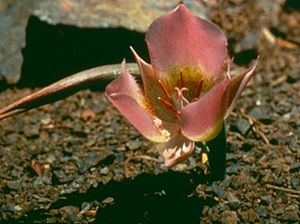Siskiyou mariposa lily facts for kids
Quick facts for kids Siskiyou mariposa lily |
|
|---|---|
 |
|
| Conservation status | |
| Scientific classification | |
| Genus: |
Calochortus
|
| Species: |
persistens
|
The Siskiyou mariposa lily, also known as Calochortus persistens, is a very rare flowering plant. It is part of the lily family. This special plant grows only in northern California and southern Oregon in North America.
Contents
About the Siskiyou Mariposa Lily
The Siskiyou mariposa lily is a type of perennial herb. This means it is a plant that lives for more than two years. It does not have a woody stem like a tree or shrub. Its stem usually grows to about 10 centimeters tall.
Where It Grows
This rare lily grows in only a few places. Most of them are on the Gunsight-Humbug Ridge in Siskiyou County, California. There is also a very small group of these plants on Bald Mountain near Ashland in Jackson County, Oregon. The lily likes to grow on rocky slopes. It prefers soils that are acidic and areas with loose rocks, called talus.
What It Looks Like
The Siskiyou mariposa lily usually has one long basal leaf. This leaf grows from the bottom of the plant and can be about 20 centimeters long. It stays on the plant even when the lily flowers. There is also a smaller leaf higher up on the stem.
The plant produces two flowers. These flowers stand upright and are shaped like bells. Their sepals and petals are a pretty pinkish-purple color. Each petal is about 3.5 to 4 centimeters long. Near the bottom of the petals, you can see bright yellow hairs. After flowering, the plant makes a fruit. This fruit is a capsule with wings. It is about one centimeter long.
Why It's Rare
The Siskiyou mariposa lily is rare because of several threats. These threats make it hard for the plant to survive and grow.
Invasive Plants
One big problem is invasive plants. These are plants that are not native to the area. They can take over and harm the native plants. For example, a harmful weed called dyer's woad (Isatis tinctoria) competes directly with the lily. It uses up water and nutrients that the lily needs. Dyer's woad also makes chemicals that stop the lily's seeds from growing.
Wildfire Control
Another threat comes from efforts to stop wildfires. In California, people try to prevent fires from spreading. This sounds good, but it can cause other problems for the lily. When fires are stopped, native trees and shrubs grow too much. Plants like Oregon-grape (Mahonia aquifolium) and curl-leaf mountain mahogany (Cercocarpus ledifolius) become very dense. They create too much shade for small wildflowers like the mariposa lily. These lilies need sunlight to grow well.
Human Activities
Building and maintaining roads and radio towers also threaten the lily. These activities can disturb the places where the lily grows. They can destroy its habitat or make it harder for the plant to thrive. Protecting this special lily means understanding and managing these threats.


